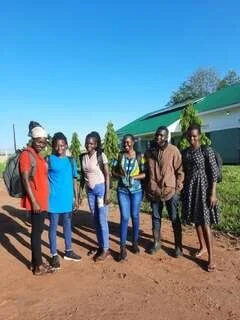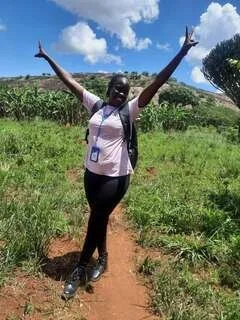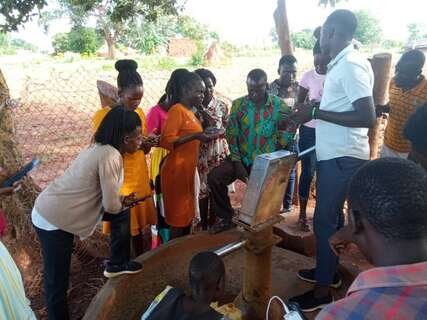The Pader Project: A Transformation of Ugandan Water Data with Highly Skilled Young People
By Binepe Bwambale and Jessalin Nguyen
Educated yet unemployed youth find skills and opportunities through mWater, resulting in sustainable livelihoods and overall improved standards of living. A select group of 50 in Uganda underwent a comprehensive training program on the mWater application, with the 20 most proficient individuals chosen to conduct data collection.
To provide safe and accessible water management systems, mWater partnered with the Ministry of Water and Environment to develop a management information system (MIS) to help Ugandan local and national governments collect timely and reliable data about water services. The project targeted two districts of northern Uganda where 2, 203 water points were mapped in Lira and 1,748 in Pader districts alone.
Of the 198 applicants, Providence Okoda, 24, was one of the 20 hired. She describes, “I was curious about the activity, and I wanted to know how the boreholes and other water points were being managed in my district, so I applied. Later, I was called for the training and after assessment, I was again contacted and later on sent to the field to map the water points. From the data we collected, I learnt that Pader has so many water points however most of them are no longer functioning. I hope that the work we did will help the Pader district receive more funds after presenting the correct number of water points that are functioning to the ministry of water and environment.”
Pader Project Training
On the training, Monica Adoch, 27, says, “Actually it was a nice session. It was my first experience with mWater and the training was perfectly done. mWater was not hard to use, especially when the instructor was good, and they were helpful by giving clear details on how mWater app works when in the field ("the training was practically done by our instructors"). I learned I can use the app online and offline, so in the field, I never panicked. If I had poor network, I could find a place with good network to sync so the data could reach the supervisors on time. mWater eased our work.”
Pader Project Training
The Pader project offered opportunities to graduates from diverse fields such as agriculture, education, vocational studies, and water engineering.
Jalon Okello, 24, states,“I am doing a Bachelor in ICT at Gulu University. I specialize in hardware, so mWater helped me use software. Before this project, I was at home, and not doing anything, so I was glad to get this experience.”
Adoch remarks, “I have a Bachelor in Agriculture and mWater is useful for other professions. For example, the UN organizations,they can also use mWater app to do surveys on food security in communities, they need an agriculture person to collect data in the field.”
Youth unemployment in Uganda, particularly among graduates, is a significant issue. Studies indicate that each year, over 400,000 young people graduate from Ugandan universities, yet the job market can only accommodate around 9,000 annually.
By hiring locally, mWater bridges this gap, providing hundreds of young individuals with job opportunities and skills that are applicable throughout their lives.
Providence Okoda, during Survey
Okello vocalizes that, “After the Pader project, I put Binepe Bwambale as a reference and mWater experience, so it’s easier to get a job. Using mWater for mapping water points, I can adapt to any job after I graduate. With the income, I grew my SIM card business. So that money helped me a lot.”
Okoda adds, “I’ve improved communication skills, using technology, knowledge on different types of water points, and experience. Organizations most definitely hire me when it's about surveys and I mention the mWater certificate. I got a survey immediately after the Pader Project with World Vision Uganda, Karenga District. Also, the money was helpful for me. I used most of the money for planting and investing in farming.”
There is a massive ripple of positive change when skilled young locals are hired. Okello encapsulates this sentiment: “I can encourage you to continue with that [methodology] for future surveys.”
Adoch points out, “Actually, it [hiring locals] was a great advantage. We can speak personally, and we know our culture like the dressing code. When we translate, we avoid misinterpretation of the survey. Also, it’s costly to get a language interpreter.” She continues, “It was a great opportunity for the young people because it’s really rare for young people to get experience since most organizations hire others with more experience. I really thank mWater for giving the youth opportunity to explore what’s in the field, go ahead to study hard, and learn how to overcome challenges in the field.”
Okoda highlights, “When you’re bored you do crazy things, so it is better to employ young people so that they don’t go drinking alcohol or do things that are not acceptable in the community Most of the data enumerators I interacted with are really grateful. Many were unemployed because of the experiences they got from the field and the certificate awarded to them by my mWater , they were able to do some temporary jobs with some other organizations (surveys). Some of them started businesses with the money they received after the survey and others made new friends all over the district.”
From overcoming language barriers to learning water software, the Pader Project proves that hiring skilled local graduates benefits everyone. This work of collecting data and empowering local communities should continue and be a new perspective for future NGOs endeavors as well as for local economies. If wanting to try for yourself, get started with this guide: mWater Portal
Pader Project Training




